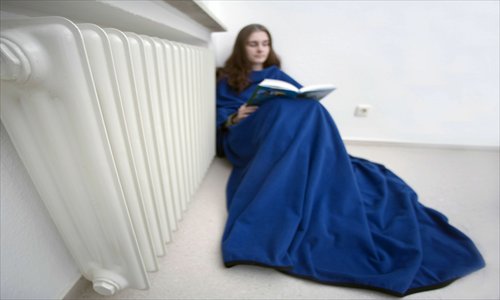HOME >> METRO BEIJING
Uncomfortably warm
By Li Lin Source:Global Times Published: 2013-11-19 19:53:01

Radiators keep our homes warm, but they are also the indirect cause of many health complaints. Photo: IC
"Since the heating came on, our room is warmer, but there's been a problem," said Liu Hongli, a 27-year-old bank clerk. "Every morning when I get up, my nose, mouth, and throat feel very dry, and my breath is worse than before." Liu was complaining about the unexpected side-effects of her apartment's central heating. Radiators were switched on citywide starting on November 15.
Liu said her son, who is only 11 months old, has also been affected by the warmer indoor temperatures. "He suffers from a cough, usually kicks off his blanket and is more likely to wake up and cry at night," said Liu. "I checked the Internet and asked my doctor friend, and I think it's all because of the heating."
Why would a warmer room cause these symptoms? Is there any scientific basis for these reports of a syndrome called "heating illness"? In fact, health complaints coinciding with the onset of the heating period in Beijing have been a longstanding annual phenomenon, but it has gotten worse as the city's air quality has deteriorated. How, then, are Beijing residents supposed to enjoy the warmth without suffering adverse effects?
Liu Zeying, deputy director of the Department of Otolaryngology at Beijing Anzhen Hospital, told Metropolitan that "heating illness" is not medical terminology; instead, it's an umbrella term for the respiratory and circulatory discomfort caused by winter heatinxg. Because people tend to keep the doors and windows shut once the heating comes on, the lack of circulation causes the air indoors to become dry and stale. This can jeopardize the respiratory system's resistance, causing discomfort and even illness, said Liu.
"You may feel irritated, dizzy and weak," said Wang Chunyan, a physician at Peking University Shougang Hospital. "If it gets worse, you start to cough and may develop bronchitis and asthma. When it gets too hot, cardiovascular disease may affect middle-aged and old people."
Additionally, dry air accelerates water loss from the skin, causing wrinkles, and from the nasal tissues, which can cause nosebleeds.
To cope with heating illness, Liu has tried different tactics. "I usually put a wet towel on the radiator before I sleep to keep the air moist, and sometimes I put pomelo or orange peel on it. The towel releases moisture into the air, and supposedly there's a kind of oil in the citrus peels that can help clean the air," said Liu. "These are two of the most effective measures that my doctor friend recommended to me."
According to Wang, it's important to keep the room temperature constant and to prevent the humidity from dipping too low. Wang also advises people to keep the radiator clean so as to prevent dust from circulating with the heated air, and to open the windows for at least 30 minutes twice a day between 10 am and 4 pm, when air pollution is not so heavy. Green plants with big leaves can help regulate humidity via transpiration, and even absorb harmful elements in the air.
"Babies and young children should receive special care during this period," said Wang. "They are less able to adjust their body temperature, so parents should select proper clothing for them to prevent dehydration caused by excess perspiration. They should also make sure the child is drinking enough water, and apply lotion to their skin after bathing to keep in the moisture."
Posted in: Metro Beijing